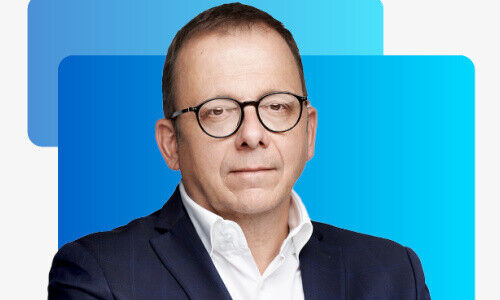The head of Avaloq Switzerland and Liechtenstein sees innovation and evolution as the main drivers in the banking software business. Depending on the institution and customer group, tailor-made solutions are in demand, he said.
Swiss-based Avaloq, which was acquired by the Japanese NEC Group in 2020, is one of the market leaders in software for banks and asset managers. The Zurich-based company currently has more than 150 customers in 35 countries.
«Software as a Service (SaaS), Business Process as a Service (BPaaS) and the shift from banks' «on-site» data centers, to external cloud services will change banking in the coming years,» Georges Roten, Regional head for Switzerland and Liechtenstein at Avaloq said in an interview with finews.com.
«As until now, innovation and developments will continue and in order to withstand competition, banks must be able to offer digital services and secure communication with customers while never losing sight of costs,» Roten said.
Digitization Push
«The corona pandemic increased the pressure among banks for a higher level of digitization and accelerated the development hugely,» Roten said. Something which can be seen in the number of payment transactions. «They have literally exploded due to online commerce, contactless card payments or apps like Twint,» he said.
Avaloq has a strong foothold in the market with its current customers, its Avaloq Core Platform and its two data centers in Switzerland. « Among our 52 customers in Switzerland, about half using SaaS and BPaaS cloud services through our Avaloq data centers in Pregassona and Glattbrugg,» he said.
This is worthwhile for small to large banks. «The smallest bank that uses this service from us has about 60 Avaloq users. The largest are mid-sized institutions that purchase this model from us for their Swiss and, in some cases, foreign entities,» he said.
The big advantage with the service model is that institutions have less capital tied up. Updates, regulation changes or replacing systems are all costly for companies's own centers. One disadvantage of the service model is that they are less customized.
Single Source of Truth
The Swiss and Liechtenstein market for core banking software is divided among the three or four largest providers, and competition only really exists among start-ups. Within this new business, few licenses are sold for «on-site» operations.
Systems are the heart of the processes. New functions and services in banking are docked onto these systems via interfaces, so-called API (Application Programming Interface).
«The core banking system is the single source of truth. That's where the master and customer transaction data is, and that's where the market data is,»Roten said.

(Image: finews.com/yr)
Roten sees Swiss banks in a very good position technologically speaking. «In other countries, (...) many institutions are still using self-developed systems,» he said.
Toolbox Enabler
Avaloq's offering is more like a toolbox that can be used to develop a customized solution for every requirement. That's how Avaloq has been portrayed in the past.
«We recommend that banks stay as close to the standard as possible. However, during the course of the projects, additional wishes and requests often arise. That makes the systems more complex, more expensive to maintain. It also creates more problems when it comes to upgrades,» he said.
When it comes to deciding what customers need, you should never imagine you know better than the customers themselves. «Banks tell us what they want, and we work closely with them to implement it. But that doesn't stop us from developing offerings and new solutions,» he said.
One example of this is Avaloq's new app that enables secure and compliant communication between customers and bank advisors via WhatsApp. «We offer these to our customers, but they decide where the journey goes.»
Stand-alone offerings
Avaloq has a broad selection of applications on offer. «We offer a number of stand-alone solutions, and in that respect we are also a fintech ourselves,» he said. The fact that banks opt for secondary providers for certain services often also has to do with risk minimization. «You don't want to have everything from a single source and thus minimize the cluster risk.» he said.
Yet «risk-mitigation» can also lead to higher costs on the bottom line «When you have two suppliers, it also always means extra work and duplication. If it runs, it runs. When it doesn't, one supplier blames the other,» he said.
«Drawing an analogy to audio technology, we are roughly at the point where Apple came out with its iPod,» he said. «Today, with the smartphone, we have access to everything from anywhere via streaming services. Similarly, banking will increasingly move to the cloud,» he added.
Personal Contact
Roten also sees limits to digitization in banking. «For normal transactions, customers today no longer need a branch. But for certain events, like buying a home for the first time and taking out a mortgage, there's a need for a personal consultation,» he said.
Many banks' advertising images also miss the reality of customers' lives. «To position banking as a fun experience, is overstated. Most low- and middle-income people want to manage their receipts and payments, maybe savings or a few securities. Really wealthy people don't enjoy that either. They are then quite happy to delegate management to experts, e.g. as part of a discretionary portfolio management mandate,» he said.
Avaloq currently employs around 2,700 people and is represented in ten countries. It manages around 4 trillion Swiss francs in client assets via the company's software. The acquisition by NEC will allow Avaloq to leverage the Japanese group's R&D resources. This will help the company drive innovation in artificial intelligence, blockchain technology, cybersecurity and biometrics.
In Switzerland, Avaloq customers count a number of cantonal banks as customers including Zuercher Kantonalbank, Basellandschaftliche Kantonalbank, Luzerner Kantonalbank and Banca Stato, Liechtensteinische Landesbank, LGT, Raiffeisen, Vontobel and Bank Cler. Edmond de Rothschild, Banque Cramer, J. Safra Sarasin or Pictet are among its private bank clients. International clients, include Deutsche Bank, HSBC, DBS and Nomura.



































